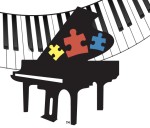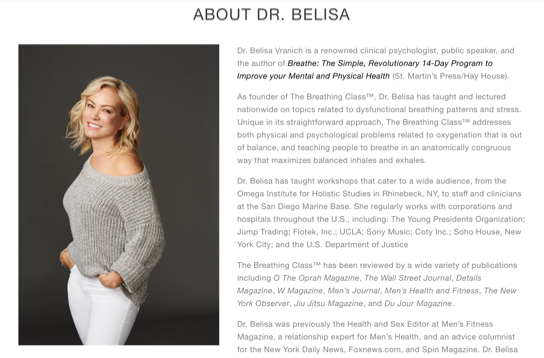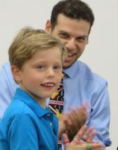Occupational Octaves: Breathe!
 This blog post focuses on the greatest consequence of poor posture – decreased breathing. Before entering the world of Special Education, I (Lee Stockner) had my eye on the posture issue and then once surrounded by mostly low functioning Autistic students, it became an omni-present issue. Every now and then I’d have a student who was naturally athletic or had a naturally stable physical core however, this was infrequent. I had to really question ‘how were my low functioning students ever going to make improvements if they weren’t getting a reasonable, or better yet optimal, amount of oxygen? I don’t want to know – I just want to improve the breathing habits of any and all of my students!’
This blog post focuses on the greatest consequence of poor posture – decreased breathing. Before entering the world of Special Education, I (Lee Stockner) had my eye on the posture issue and then once surrounded by mostly low functioning Autistic students, it became an omni-present issue. Every now and then I’d have a student who was naturally athletic or had a naturally stable physical core however, this was infrequent. I had to really question ‘how were my low functioning students ever going to make improvements if they weren’t getting a reasonable, or better yet optimal, amount of oxygen? I don’t want to know – I just want to improve the breathing habits of any and all of my students!’
Shoulders back, wrists up, fingers round – it all starts with posture. But what’s the biggest purpose? BREATHING!
Although the goals of a Special Needs Piano Lesson are prioritized specifically for individual students with individuals needs, the road to musical success should be as close as possible to the real thing, which special educators would refer to as “mainstream” piano lessons. Frequently, my low functioning, nonverbal, hyperactive, and physically disabled students cannot conquer the lofty challenges of mainstream lessons. I’ve had students who are too weak for strong posture or will purposely slouch if asked to sit up straight due to defiant behaviors. The choice to pursue mainstream goals like positive posture while so many other challenges exist highlights the consequences of not being able to engage in the most basic aspects of playing.
While the benefits are widespread, I’ve come to believe the most important purpose for strong and aligned posture is simply to avoid lung compression so a student’s breathing passages are as clear as possible. Many of my students don’t understand how to take a deep breath when instructed to do so and few are conscious of the importance of breathing patterns. If a student’s breathing is not regulated, trying to fix a comprehension or physical positioning issue at the piano, or in any educational environment, serves a significantly reduced purpose.
Similarly to the goals of Music Therapy, a Special Needs Piano Lesson revolves more around the non-musical goals related to playing than the actual sonic result. If deep and/or consistent breathing can be learned by a student who is failing to do so independently, achievement of proper breathing carries a much greater purpose in a person’s life than that of playing a given song.
Learning songs breeds musicianship but learning to breathe properly empowers life.
It has been my experience that oxygen is the gasoline for comprehension and a person’s ability to perform specific actions that, when hindered, drastically reduces various areas of productivity.
It seems to me that since most piano teachers began their own piano study at a very young age, most of us simply teach what we were taught and make adaptations when problems arise. Were you taught why posture is so important during a lesson or were you just taught that you needed to do it?
As a piano teacher who first reached goals of posture through goals of playing, I know my aligned spine is both necessary and challenging; I know the pain of sitting up straight for an hour of practice but I also know that my greatest accomplishments in high level classical music might not have been reached without it.
We trust in strong posture, right? But how much better can our educational approach to this issue be if we add greater purpose to the goal – human empowerment. I’d encourage you to explain to your students that you’re trying to help them be successful in areas of life that has nothing to do with them actually playing music.
Let them know that all of these long term goals that are a nuisance in the short term are all designed so that other aspects of their life can be stronger through the diligent work of learning to play. Explain that expanding breathing expands concentration which can lead to better grades in school; explain that breathing deep is a tenet of dance and sports which the student may enjoy and connect with more than the piano.
When people stress and panic we all have to reclaim our oxygen to be able to problem-solve.
In my career, when I work with a student who can’t conceptualize or communicate these ideas, I simply become a breathing cheerleader who may as well have Pom-Poms and a marching band behind him when a low functioning student takes an independent deep breath. I utilize token boards and prizes for reinforcement while doing almost anything I have to do to connect the positivity of the breath to the positivity of my reaction.
I define the goal for the students who may lack the comprehension skills necessary by displaying excitement that I call “surrogate enthusiasm.” This means that when a student doesn’t know that they’ve done something very well, I have the positive reaction which I hope to be so rewarding that a student seeks it out again. If they seek the surrogate enthusiasm I display when they breathe, breathing should increase overall!
The importance of oxygen for virtually any task in life has always been known, but the experts of today are more prepared with the fruitful science behind proper breathing. I’d suggest reading about Dr. Belisa Vranich, who the US Army has recently hired to bring her breathing expertise to some of the most important members of any society, our soldiers.
There’s also the Wim Hof breathing method which has proven incredible enhancements for endocrine-immune function and how one can self-target and sometimes cure specific internal disorders. My personal favorite is former mixed martial arts champion Bas Ruten, who is the inventor of the “o2 Trainer,” which he used to cure his own asthma and I plan to purchase myself for general life improvement.
If Oxygen is the key to life, then it must be a tenet of every activity, including learning the piano. If the lungs of your student(s) are compressed at the piano and breathing pathways aren’t open, it becomes YOUR responsibility as the teacher to fix this problem, whether your student has a challenging diagnosis or not!
Lee Stockner



So glad Lee’s insights can be put right to use to help a student thrive. Many thanks for reading PA!
Thanks for this, my student begins her new term next week and I’m gonna need this!